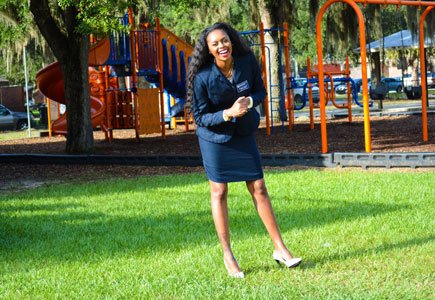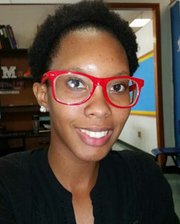When deciding on a black history project for her fourth grade class at Calvin M. Rodwell Elementary School, Naadir Billingsley took into account how the students would connect to the project and she used their background knowledge to enhance the learning experience.
When Se’Kayla Harrell spoke to her fifth grade class at George Washington Elementary School, she was surprised that her students knew just the generalities of Black History Month, Martin Luther King Jr. and Rosa Parks.
Naadira Billingsley
“This was very shocking to me but it only showed me how big of an opportunity we had this year to explore and introduce the students to new people and how great their history actually is,” Harrell said.
Both Billingsley and Harrell say they’ve decided to make black history a part of their regular curriculum.
The two educators were trained through Urban Teachers, a teacher prep program in both Baltimore and Washington, D.C., that specifically supports teachers to enter into urban and low-income city schools.
“Urban Teachers helped me to prepare for teaching black history to my students because they emphasize the importance of making connections with students,” Billingsley said.
“When deciding on a Black History Month project … I let the students guide their project and what they wanted to learn about African-American history,” she said. “I thought about the ‘why.’ It wasn’t just a project because it was February and Black History Month. I thought about how the students can use the information they learned from this research project in other classes and for the rest of their lives.”
Incorporating African-American history into the curriculum is extremely important because African-Americans were and remain a large part of America’s history, Harrell said.
“African-Americans also aren’t represented nearly enough as they should be and Black History Month is usually the only time that we would see them,” she said. “I believe that working in urban schools gives us an even greater responsibility of letting our students see a reflection of themselves in what they learn and my students have been extremely receptive to this. They are excited to learn about some of the amazing accomplishments of African-Americans and this unit has pushed then into inquiring and thinking about their history on their own. The enthusiasm in the classroom is always at an all-time high.”
Formerly called Urban Teachers Center, Urban Teachers was founded in 2009 as a means to solve what officials called a critical challenge in urban education, the new teacher quality.
The organization built a break-the-mold teacher preparation program from the ground up to ensure every teacher would get the experiences and support they need to produce results with students.
Urban Teachers started in what was identified as the highest-need districts in the nation, Baltimore and Washington, D.C., and, since 2010, they’ve welcomed more than 500 aspiring teachers, preparing them for the classroom and to become top-notched educators.
“I think the most important aspect I learned from Urban Teachers is that no teacher is perfect and teaching is a practice,” Billingsley said.
“Every lesson is not going to go perfectly as planned and that’s okay. You can be a great teacher but there is always room for improvement and collaboration with your colleagues,” she said. “This is the most important because the hard days will come when you feel like nothing went as planned. Those days you may feel defeated, but having this thought in the back of your mind, brings me to work the next day, with a clear mind, and ready to teach the best lesson I can for my students.”
For Harrell, the most important aspect of Urban Teachers is the support she receives and the ability to shadow a veteran teacher while having coaches to observe progress.
“Being able to constantly apply the teaching strategies and skills that we’ve learned in class in actual urban classroom setting is an irreplaceable benefit that has allowed me the most growth as a new teacher,” Harrell said.

